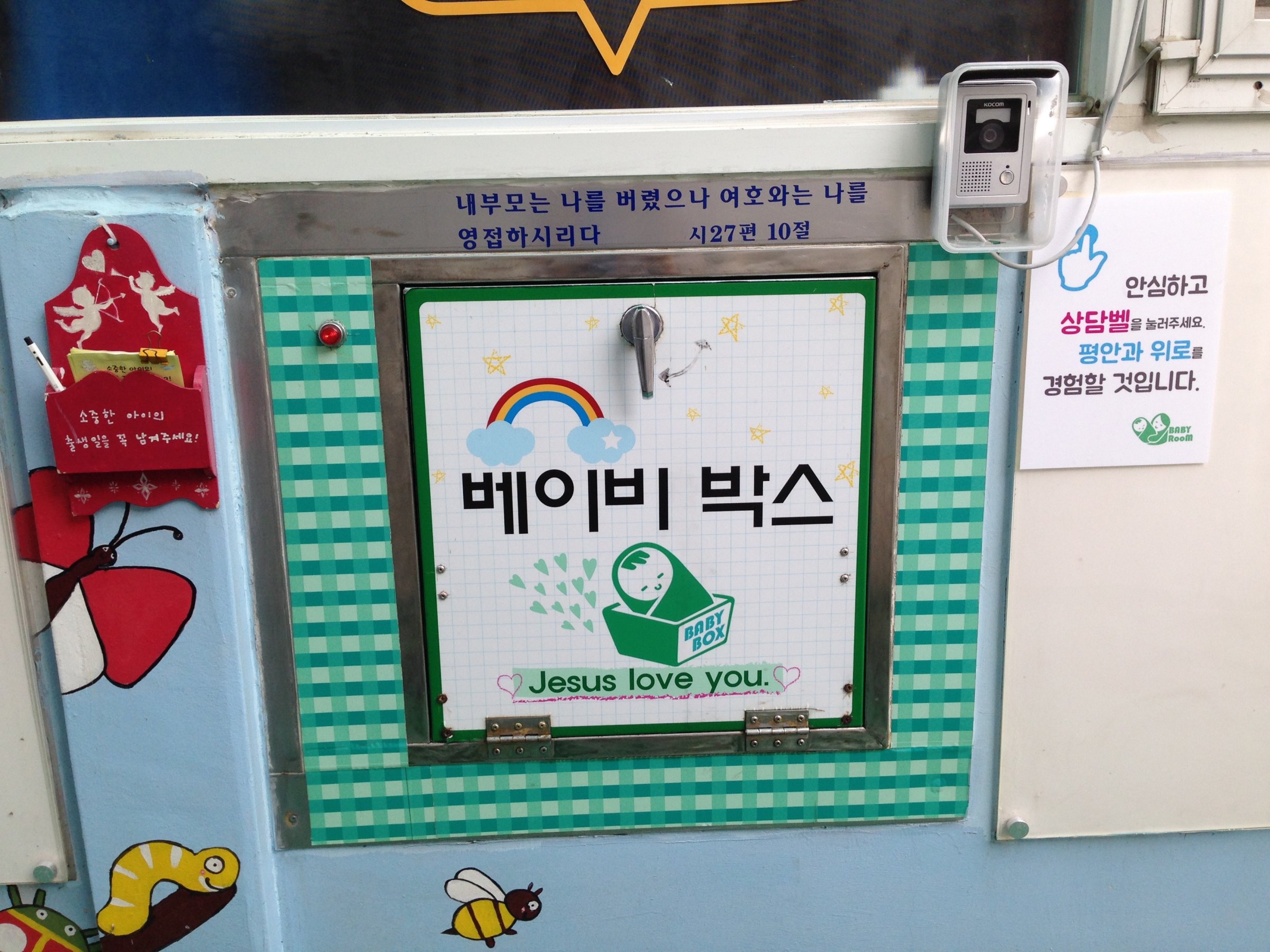
Mimi Shim interned at the Baby Box during her Global Health Practicum with Columbia University Mailman School of Public Health and is currently a research nurse at Rockefeller University Hospital
Correction appended, Sept. 16, 2016
Every time I heard the bell ring, signaling the opening of the insulated and sensor-equipped Baby Box in Seoul, my body jolted. It meant that a baby was being placed inside. It meant that a parent was giving up their child.
I spent three months in Seoul in 2015 working at the Baby Box, an organization that provides temporary shelter for infants and crisis intervention for parents. Reverend Jongrak Lee decided to build the drop box into the side of his home in 2009 after one winter night when he experienced the unexpected arrival of a baby, freezing in a cardboard box on his doorstep. From December 2009 to August 14th, 2016, 1,000 babies have arrived. Another Baby Box was started outside of the city in 2014.
Baby boxes, or baby hatches, have been utilized around the world for centuries as places where parents can give up their children to others—a safe alternative to abandoning the child in the streets. But while many countries, including South Korea, Australia and Germany have baby box facilities, they don’t always have clear legal policies protecting the parents.
South Korea lacks legal protection for mothers to deliver anonymously and therefore, many mothers resort to delivering in secret without immediate medical care. There is also no law that prevents the government from prosecuting parents who leave their unharmed child at a Baby Box, nor is there a safe alternative for abandoned infants if the government decides to forcibly close the Baby Box facility.
South Korea should look to countries like the U.S. and Austria, which have Safe Haven Laws that provide legal protections for parents to relinquish their babies with personnel at designated locations.
The baby box facility in Seoul, which was the subject of a recent documentary, operates 24-hours a day, seven days a week and is supported through donations. Full-time staff work 12-hour shifts to counsel birth parents upon arrival, and volunteers assist with taking care of the infants who need 24-hour supervision. The staff assess situations and provide resources to parents. The babies are then transported to Seoul Metropolitan Office Children’s Welfare Center to be placed in orphanages.
Why do some parents give up their children to the baby box?
Some are facing the social stigmas of having a child while unmarried, underage or from an extramarital affair or rape. Others see it as an alternative to abortion: one of the mothers said that she valued the life of a baby more than terminating the pregnancy, but was not mentally and emotionally able to raise the child by herself. Parents often resort to the Baby Box when other resources and options have been exhausted.
Furthermore, a policy change has prevented some parents from putting their children up for adoption. In the past, mothers who were legally able to process paperwork could request to send their children to an adoption agency immediately after birth. But after August 2012, the Special Adoption Act started to enforce more requirements, including the consent of both parents (unless whereabouts of parents are unknown), a seven-day waiting period after birth and an obligation to register their newborns in an official registry. The desire to give up their children anonymously has led many to the Baby Box.
What can be done? South Korea can learn from efforts to help abandoned babies in the U.S. And systematic changes in culture and policy are necessary to prevent child abandonment in the first place.
According to Save Abandoned Babies Foundation, from 2001 to 2015, there were 3,227 babies who were saved through Safe Haven Laws. The first Safe Haven Laws in the U.S. were enacted in Texas in 1999, allowing infants to legally be left at health-care facilities, fire stations and police stations. In April 2016, the first climate-controlled baby box in the U.S. was constructed along the wall of a local fire department in Indiana to provide a secure area for babies to be dropped off anonymously. A 24-hour hotline is available for parents to reach knowledgeable staff about the laws and drop-off procedures, and the U.S. also has many resources, including Planned Parenthood and Nurse Family Partnership, that provide services to first-time and low-income mothers.
I hope to see Safe Haven Laws passed in South Korea to help decrease neonaticide, increase protection of parents with anonymous relinquishment, and increase delivery in health facilities to provide immediate medical treatment. Furthermore, I hope Safe Haven Laws will legally acknowledge the Baby Box facility or provide alternative methods or resources. The country can also place more emphasis on counseling parents. During my three months in Seoul, I saw parents change their minds after counseling and return home with their child. Human interaction can help encourage parents to give their child a name, identify the date of birth, or write a final letter to their child to help with closure.
Each baby is a life who should be given a chance to reach his or her potential.
Correction: The original version of this article incorrectly described one of the criteria for parents in South Korea to give up their child. Consent from a guardian is needed for a minor to give up her child.
More Must-Reads From TIME
- The 100 Most Influential People of 2024
- The Revolution of Yulia Navalnaya
- 6 Compliments That Land Every Time
- What's the Deal With the Bitcoin Halving?
- If You're Dating Right Now , You're Brave: Column
- The AI That Could Heal a Divided Internet
- Fallout Is a Brilliant Model for the Future of Video Game Adaptations
- Want Weekly Recs on What to Watch, Read, and More? Sign Up for Worth Your Time
Contact us at letters@time.com